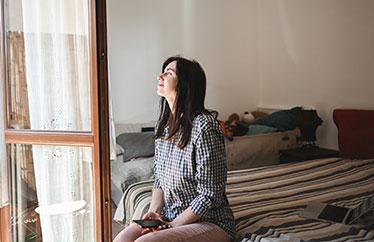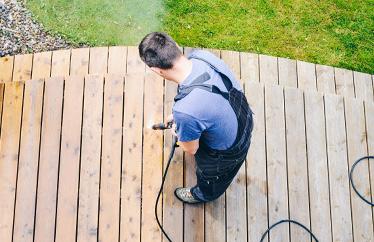Guide to Summer Home Maintenance & Safety

Summer is finally here! Time for cookouts, bonfires, outdoor activities and time by the water. However, all this time outside can lead to potential dangers if you’re not properly prepared. In addition to slathering on the SPF to protect everyone from the sun’s rays, there are repairs and installations you can make throughout your home to give your family the fun and safe summer they deserve. (And without breaking the bank — talk about a smart summer money move!)
We’ve put together all the tips you need to keep your family and home secure throughout the summer. We also spoke with parenting and safety experts to help you set groundrules with your kids for the summer months. With proper preparation and a safety plan in place, you’ll be set for the best summer ever.
Table of contents
- Preparation: summer home maintenance
- Security and monitoring
- Summer to-do list and upkeep
- Grilling and fire protection
- Pool safety
- Setting safety rules
- Additional summer safety tips
Preparation: Summer home maintenance tips
To prevent accidents and costly repairs, prepping your home for the summer months is a must every spring. From high temperatures and unexpected storms to the general wear and tear on the inside of your home, there are a lot of things to get ready for. First, it’s important to take inventory of what maintenance is overdue in your home.
From repairing broken appliances to cleaning out your AC ducts, there are lots of summer home maintenance projects that can save you money and keep everything running smoothly. In fact, the Department of Energy recommends performing an energy audit on your home once a year to determine where your home could use some upgrades to lower your carbon footprint and utility bill.
To keep the outside of your home looking great and keeping you safe, make sure to add these items to your to-do list.
- Install sun shades to your windows to deflect heat.
- Reseal any cracking caulk or weatherstrips on external windows and doors to prevent any leaks.
- Inspect the outside of your home for cracks and any overhanging tree limbs that could fall during a storm.
- Protect yourself in the event of a flood from a summer storm by double checking that you have flood insurance added on to your home insurance policy.
- Spray your yard and home to protect it from insects, pests and other creatures, setting traps or deterrents when needed.
- Schedule a yearly inspection each summer to help catch termites and stop them in their tracks before they cause major damage to your home’s structure.

Keeping bugs at bay can often entail chemicals or pesticides, so safe use should be top-of-mind. Dr. Samantha Radford, owner of Evidenced-Based Mommy, shared with us the importance of safety when these chemicals are in use: “If you choose to use pesticides in your home garden, make sure kids know to stay away after application and as least as long as manufacturers say it takes for the chemical to dissipate.” Taking a little time to explain the dangers of these items to your child can help prevent injury from early exposure or in case they’re accidentally left out.
If you have young children, you’ll also need to do a sweep of the inside and outside of your home for potential hazards (such as exposed electrical wires, cleaning supplies, etc). Radford says, “with kids going outside more during the summer, it's important to think about toxic chemicals in the home and garage. Make sure all dangerous chemicals (pesticides, rat poison, fertilizers, cleaners, etc) are in a locked cabinet or a shelf well out of children's reach.” Though that's not to say kids can't get involved in the cleaning process, just turn it into a fun game and keep an eye on them when their nearby toxic chemicals!
Adding a first-aid kit, fire extinguisher and poison control information on every level of your home is good thinking as well — they’ll help you respond quickly in the event of an emergency (building an emergency preparedness kit is a good idea as well).
Security and monitoring
As temperatures rise in the summer months, unfortunately so do the rates of home break-ins and theft. A study by the Bureau of Justice Statistics found that, on average, there is an 11% increase in home-based crimes during the summer months. And though we may be staying home more than ever before, this increase is enough to make anyone nervous during a weekend getaway. But thankfully, smart home technology has advanced in recent years, giving homeowners control over their home protection and monitoring capabilities.
Recent additions to the smart home market include indoor and outdoor cameras, motion detection lighting and automatic locks that can alert you on your phone any time someone locks or unlocks a door. These devices are not only helpful for identifying and stopping burglaries, but they’re also great for monitoring your children's activity throughout your home. Some devices even allow you to speak to your children or play music directly through a speaker system.

Smart home devices also offer additional benefits outside of the added security and lowered energy usage. Ultimately, their purpose is to help you streamline your life, making everyday tasks a bit easier, like going to the grocery store, unlocking your door or scheduling regular maintenance appointments. And your insurance company isn’t lost on their benefits either. Let them know once you’ve installed a few of these time-saving devices throughout your home and get ready to rake in the discounts.
Summer to-do list and upkeep
When we’re around more often (like during the summer or during shelter-in-place orders) our homes, appliances and devices go through something known as home strain. And with a global pandemic keeping us home more than ever before, home strain is reaching new heights. According to a recent Hippo survey, one in three Americans have already needed home repairs while sheltering in place, and as more of us begin to work from home, this issue is likely to continue. The most needed repairs come from issues with power surges, broken kitchen appliances and damaged electronic devices.
To help counteract the effects of home strain, it’s important to thoroughly clean your home, appliances and devices every month. Electronic devices and other household appliances run faster and last longer with regular cleanings, as it helps prevent dust, dirt or soap scum buildup. Regular cleaning also gives you the opportunity to inspect for damage so you can fix small issues before they get bigger. Make sure you inspect and clean every nook and cranny of your home (don’t forget the garage) to check for potential leaks, buildup or cracks in the foundation.

Before tackling any home repairs yourself, consider talking to an expert over the phone or setting up a socially distant repair appointment. This will ensure your home is updated properly and should help you avoid another round of repairs in a few months. If you’re unsure how to follow the CDC’s recommended safety guidelines when scheduling a repair appointment, give the experts at Hippo Home Care a call to get the care you deserve.
If you’re doing another round of deep cleaning this summer, there’s no need to worry about how to host a socially distant garage sale. Post your items for sale on a website like Craigslist or an app like OfferUp to get rid of things you no longer need. Just make sure you set up no-contact payment and delivery to ensure the safety of you and your buyer!
Grilling and fire protection
Grilling, fire pits and bonfires are all favorites during the summer months — who doesn't love roasting marshmallows after a fun day in the pool or on the lake? Keep in mind, though, that these can be dangerous if not handled properly. This is especially true if you have young children in the house, as they can accidentally injure themselves or others. Below are things you need to be aware of before grilling or starting a bonfire this summer to keep your family (and your home) safe.
The number one tip to remember: never leave a fire unattended. This will help keep the fire under control, as well as prevent any potential injuries from children or pets getting too close to the flame. Our Hippo Home Care team recommends keeping your fire pit or grill at least 10 feet from your home or any other structures (shed, dog house, etc.), and away from any overhanging trees. Basically, if it’s flammable, keep it far away from the fire. Do not let pets or children within three feet of the fire, and limit their activity around the fire pit or grill to prevent trips or falls that can lead to bigger accidents.
When going inside for the night, it’s important to fully extinguish the fire — don’t just let it burn out. This will help ensure the safety of your backyard and home. While it’s recommended to keep a fire extinguisher on-hand for emergencies, a fire pit or grill can simply be put out with water once you are finished with it. It’s also a good idea to keep a first-aid kit nearby in case of accidents or burns.

Pool safety
Whether you have an in-ground pool, a hot tub, above ground pool or inflatable pool, children should always be supervised while swimming. If possible, enroll your children in swimming lessons early or teach them how to swim yourself. As they’re learning, they should always have a life jacket or other flotation device on before getting in the water. To make sure you’re prepared in the event of an accident, become CPR-certified and keep a flotation device, first-aid kit and scissors (to cut pool covers or clothing) nearby at all times.
In order to keep swimming fun and safe for the whole family, make sure that pool safety measures are agreed upon and in place beforehand. To ensure you know when your child is near the water, add back door and gate alarms to alert you of any movement near the pool or hot tub. Smart home devices like outdoor cameras are another great option, as they allow you to monitor outside activity from afar. It’s also important to keep your pool covered when not in use — to prevent anyone from falling in. When the pool isn’t covered, a device like a water sensor can alert you to any movement under the surface.

Preparation and monitoring are key to accident prevention each summer. With a few simple upgrades, proper liability insurance to protect yourself in the event of an accident and lots of SPF, you can rest assured that your backyard is safe for your children and pets. This will help you all focus on creating a summer full of fun memories by the water.
Setting safety rules
Children’s safety is the ultimate goal of every parent, but unfortunately it’s easier said than done. Since you can’t keep your eye on them 24/7, it’s important to talk with your kids about summer safety, including the limits you’ve placed on how far they can venture out or what activities they take part in without you nearby.
In addition to installing safety measures like gates around the pool and locks on medicine cabinets, it’s important to let your children know what type of play is and isn’t allowed. Playing in a parked car, for example, can easily turn dangerous in the summer heat. “Always lock your car when it's not in use, even if it's just in your garage or driveway,” says Emilia Lewis of Pursue Today. “Young children often see a car as a jungle gym and may go in it to play, and not know how to get out.”
As your kids get older, they'll likely want to venture out to play with friends away from home. Remember all the fun you had as a teenager? You probably also remember your parents setting rules to keep you safe. Before letting them out to play, establish ground rules for how far they can go and for how long so that you know they aren’t straying too far from home. Make sure they know the potential dangers of your area and have your cell phone numbers memorized in case of an emergency. This way, they can enjoy summers as a kid to the fullest extent while still giving you some much needed peace of mind!
While this may seem like a lot, setting up ground rules before temperatures rise can help ensure that everyone has a safe and fun summer (not to mention giving you some well deserved alone time). Below, we highlight the most important things you need to discuss with your child to keep them safe all summer long.

Additional summer safety tips
The joy and insanity unique to each family means that there may be some safety issues that you need to address within your home that we didn’t include here. Because of this, it’s a good idea to do a full walkthrough of the inside and outside of your home, as well as your front and back yards, to ensure you aren’t missing any glaring issues such as holes in your fence, broken locks or hazardous items that have been left out. A short task that is so important to your family's safety, walkthroughs can easily be overlooked if you’ve lived in your home for quite some time. But we really suggest taking 20 minutes to do this each season — you won’t regret it when you find that small issue that could be harmful to your children or pets!
No matter if your yard is relatively empty or full of toys and playground equipment, an overall inspection should be done before letting your children play. Make sure there aren’t any holes in the ground or damage to the playground equipment, and make sure to address any issues you find before letting your children run around. Other home hazards like mold growth or sewer backups should be monitored on a regular basis to avoid any costly repairs down the line. For more in-depth tips on how to protect your home this summer, check out our article on summer home hazards.
While pools and bathtubs may be obvious drowning dangers, it’s important for parents to know that even their toilet poses potential risks. “One point I think a lot of parents miss is the risk of drowning in the toilet,” says Radford. “Fitting a toilet seat lock stops small children from getting access unsupervised.” A child can drown in as little as two inches of water, so locking up any areas of standing water is crucial to preventing accidents.
With summer in full swing and shelter-in-place orders continuing throughout the nation, you’ll likely be spending most of your time at home. This means that total home safety is more important than ever, so make sure you carve out spare time for cleaning and repairs — plus time for fun too! And while you may be able to make most repairs yourself, some things are better left to the professionals. Check in on your homeowners insurance policy to see what preventative care and repairs are covered, or reach out to our expert team to help you get started. Looking to extend your home's safety past the summer months? We have a guide for holiday season safety as well.



